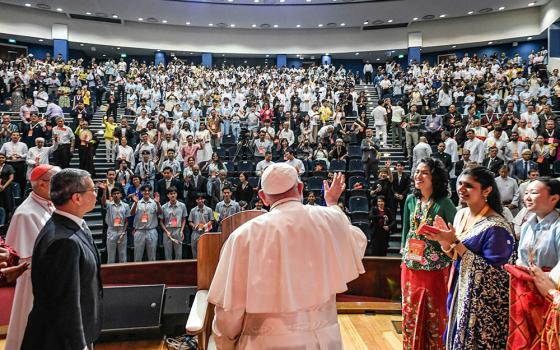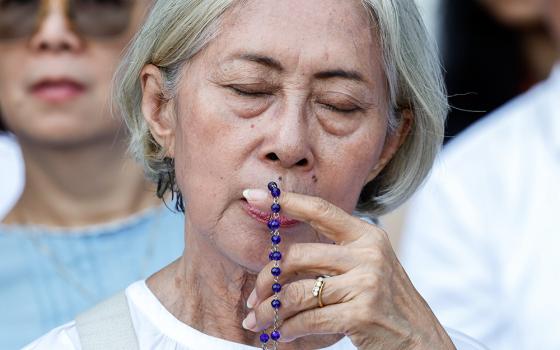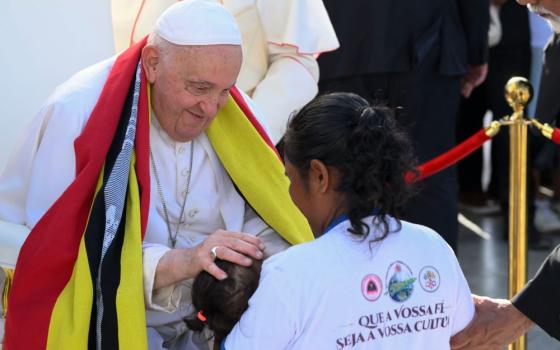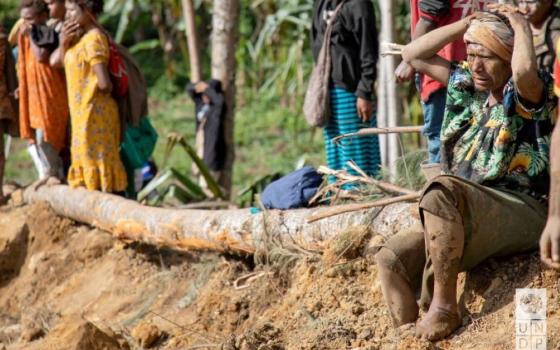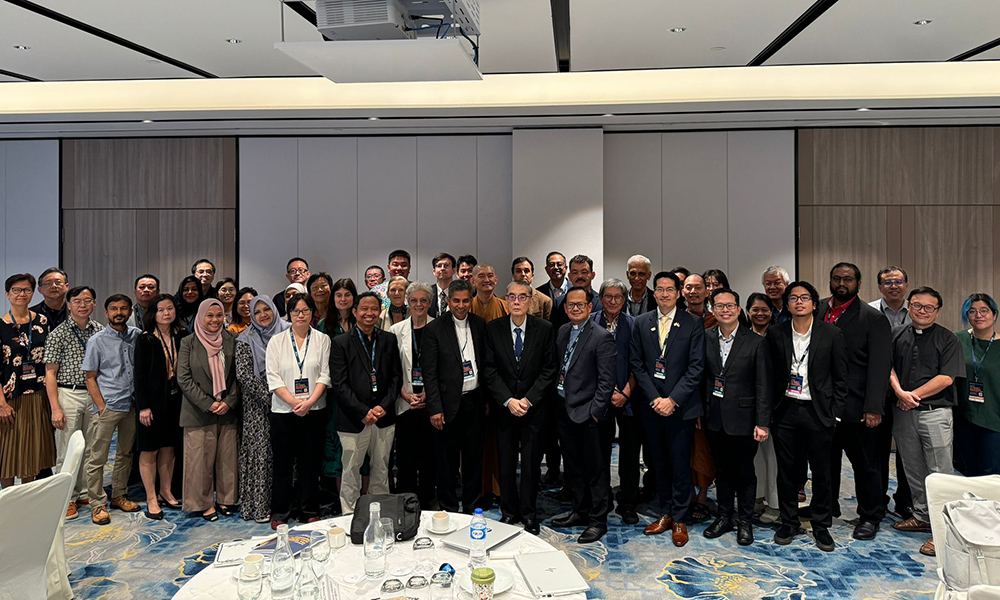
Attendees of the "The Vatican and Inter-religious Diplomacy in Asia" conference held Aug. 29-30 in Singapore (Courtesy of Edmund Chia)
"The Vatican and Inter-religious Diplomacy in Asia" conference was held Aug. 29-30 in Singapore, bringing together scholars and religious practitioners to discuss the Catholic Church's contributions to interreligious relations in anticipation of Pope Francis' Sept. 11-13 visit to Singapore. The conference's aim was to examine how Catholic communities and the Vatican have been engaging with the continent's religious traditions in the context of the political and social diversity of Asian societies.
Conference convener Michel Chambon, of the Asia Research Institute of the National University of Singapore, introduced the conference by highlighting the centuries-long engagement of the Holy See in Asia. Despite occasional controversies and conflicts, the Vatican continues to make significant inroads in interfaith diplomacy, interreligious dialogue and international relations, Chambon said.
In his plenary address, Msgr. Indunil Janakaratne Kankanamalage, secretary of the Dicastery for Interreligious Dialogue, clarified that he was present not so much to engage in diplomacy but to promote dialogue. While the former implies give and take and even compromise, the Vatican understands the latter as referring to activities aimed at enhancing relationships and advancing goodwill between the Catholic Church and other religions.
Pointing to the document "Human Fraternity for World Peace and Living Together" which Francis issued, along with the grand imam of Al-Azhar Sheikh Ahmed al-Tayeb, on his visit to Abu Dhabi in 2019, Kankanamalage averred that "in place of an apparent clash of civilizations," Francis calls for "a culture of encounter" and that "in place of tribalism," he advocates "fraternity." He also made mention of a forthcoming Buddhist-Christian colloquium on the theme of "Buddhists and Christians: Working Together for Peace Through Reconciliation and Resilience" sponsored by the Vatican that will be held in Cambodia in 2025.
Discussing interreligious relations in Japan, Xaverian Missionary Sr. Maria De Giorgi began by recounting the leadership roles played by Japanese Cardinal Peter Seiichi Shirayanagi, especially in the founding of the World Conference of Religions for Peace in 1970, together with his Buddhist counterpart Rev. Nikkyo Niwano of Rissho Kosei-kai. She then related the efforts of the Shinmeizan Interreligious Dialogue Center in Japan which actively promotes Christianity's dialogue with Japanese culture and religions, in particular through contemplative prayer and Zen meditation. Built on a hill and surrounded by forests, nature becomes the place of meeting God, tranquility the condition for hearing God's word, and hospitality welcomes peoples of other religions as brothers and sisters, De Giorgi said.
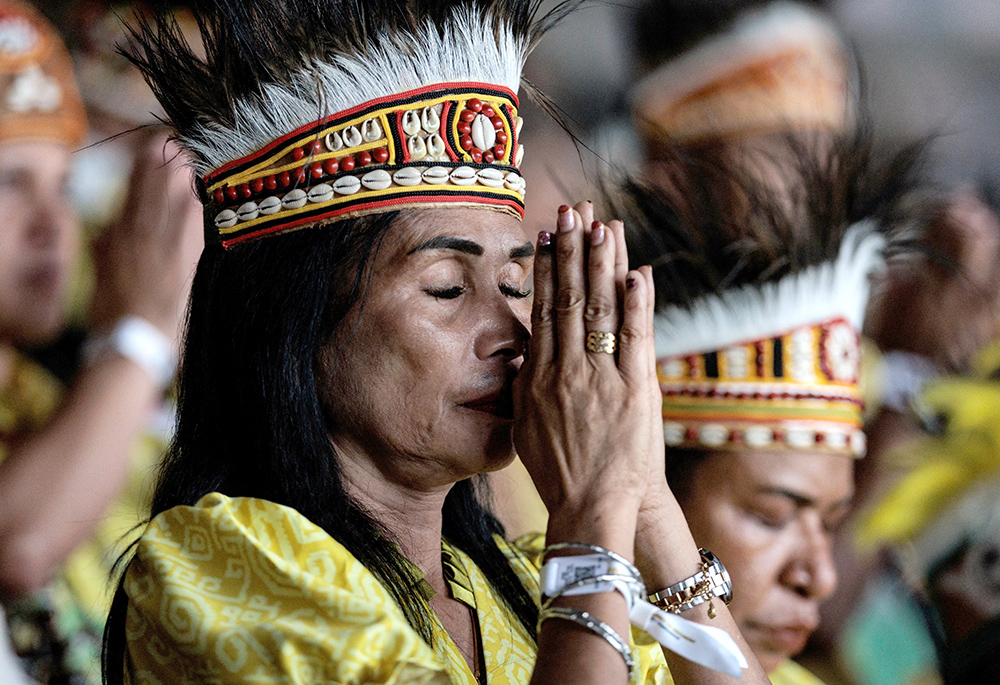
A woman prays as Pope Francis celebrates Mass at Gelora Bung Karno Stadium in Jakarta, Indonesia, on Sept. 5. (OSV News/Yasuyoshi Chiba, pool via Reuters)
In anticipating Francis' visit to Indonesia, Jesuit Fr. Bagus Laksana, president and rector of Universitas Sanata Dharma in Yogyakarta, shared that the pontiff will see in the Indonesian church a "vibrant and self-confident community … no longer viewed as a foreign and menacing religion … willing to contribute to post-colonial Indonesia and its role in the region and the global community." Bagus introduced the term "Ukhuwah Wathaniyah" (used by Indonesian Muslims to describe their attitude towards the homeland) in outlining the Indonesian Catholic church's own commitment to promoting social solidarity and national integration in the face of the rise of religious nationalism.
Rector of Sunan Kalijaga State Islamic University of Yogyakarta professor Al Makin confirmed Bagus' assertions when he discussed the works of prominent Catholics. In particular, he said, "Catholic priests such as Driyarkara, Mangunwijaya, Sugiyopranoto, and Magnis-Suseno demonstrated inclusive leadership that extended beyond their own faith," enabling them "to foster cooperation with Muslim leaders such as Sukarno, Nurcholish Madjid, Mukti Ali, and Abdurrahman Wahid in promoting interfaith harmony."
Political scientist professor Francis Loh of Malaysia spoke on the complexities of the ethnic-religion dynamics for the Malaysian church. While most "bumiputeras" (literally "sons of the soil" in reference to the ethnic Malays and Indigenous peoples) are Muslims, there is also the reality, according to Loh, that 80% of Christians in Malaysia are also bumiputeras. They belong to the Indigenous tribes of East Malaysia and worship in the Malay or Indigenous languages instead of English, Chinese or Tamil as is common for Christians in Peninsula Malaysia, Loh said.
The church in Malaysia, therefore, has to recognize itself as a bumiputera-majority church. In the context of the 1970s-1980s Islamic resurgence in Malaysia, the Christian minority experiences discrimination by the dominant Malay majority. In response, Loh insists, "Christians must enhance their participation in struggles for justice, freedom, unity and peace." More importantly, "They have to do this in collaboration and with the many Malay and Muslim advocacy movements and other multiethnic human rights organizations."
Advertisement
Professor Lai Pan-Chiu of Chinese University of Hong Kong focused his presentation on Francis' encyclical "Laudato Si', on Care for Our Common Home," especially the concept of integral ecology. Beginning by stating that Confucian scholars have been rather muted in responding to the encyclical, he posited that the concept resonated well with Confucian thought in general, particularly as expressed in the Western inscription of Neo-Confucian scholar Zhang Zai. He concluded that a greater dialogue between Roman Catholicism and Confucianism could not only enrich both traditions but also environmental ethics and the well-being of all life.
On the flip side, he said, it has to be noted that Confucian-Christian dialogue has in fact been taking place since the 17th century, especially in dealing with the Chinese Rites Controversy. Jesuit Fr. Matteo Ricci advocated that Chinese converts to Christianity be allowed to practice ancestral veneration. The Vatican, however, forbade it in its 1715 papal bull Ex illa die, reaffirming the ban in its 1742 papal bull Ex quo singulari. The Chinese emperor regarded the Vatican's action as an insult to the people's Confucian beliefs and responded by expelling the missionaries.
It took almost 200 years for the Vatican to reverse its prohibition of the rites of ancestor veneration when it issued the two instructions entitled Pluries instanterque (1936) and Plane compertum est (1939). Suffice to say, if the church had been more diplomatic in its relations in China, the history of Chinese Catholicism might be very different today.



